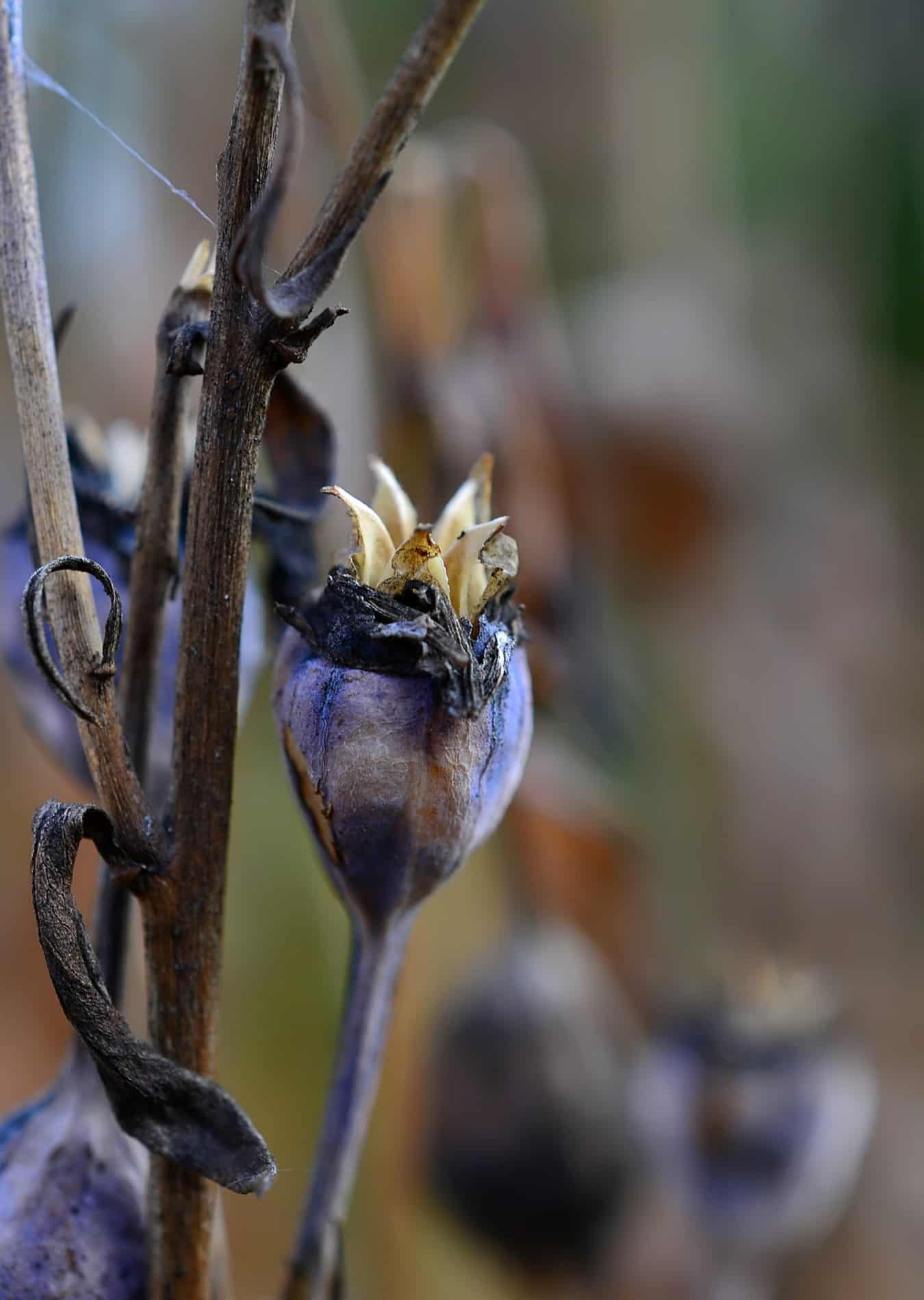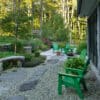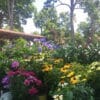Joy and Melancholy in the Native Plant Garden
A guest post by Real Eguchi and Marlise Akazawa-Eguchi. All photos are by Terry Flanagan.
Reproduced with modifications and with permission from Wildflower magazine, a publication of the Lady Bird Johnson Wildflower Center.
The original article was based on a presentation of the same title given by Real in February 2010 at the symposium Living Plants, Liveable Communities: Exploring Sustainable Horticulture for the 21st Century. It was organized by the Canadian Institute for Sustainable Biodiversity, Royal Botanical Gardens, Burlington, Ontario, Canada.

After many years of spending time as larva underground, the cicada surfaces in the garden. In this image, the adult is emerging from the larva stage. The process takes only a matter of minutes, and while an insect seems ordinary, to experience the process is extraordinary. Taking time to observe and experience the transitory nature of the garden helps us to acknowledge and embrace our own transience. Very shortly after this cicada took flight, it was eaten by a bird. In the process that we call life, there is joy and there is sadness.
You probably never thought gardening had anything to do with Botox. Twenty years of professional landscape architecture practice has shown us that they are indeed related. Both are part of our cultural practices and indicate how poorly we view and value nature. The garden, however, can uniquely inspire us toward positive change.
Thanks in part to initiatives like SITES, we are beginning to understand that gardens can perform important ecological functions such as cleaning the air or helping to manage storm water in a very significant way. But we can’t seem to reconcile our decorative sense of beauty with our ecological awareness.

The ‘sustainable beauty’ of the native plant garden can keep us mindful of natural processes in our day-to-day life. For example, we all enjoy the process of a butterfly being fed by a flower while helping that flower to reproduce. In our practice, we are beginning to view the native plant garden as a crucial instrument that can help us understand that we are natural beings. This understanding is essential to increasing our respect for nature and to creating a sustainable future.
Currently we enjoy ‘civilized,’ technologically enhanced lives. We decorate and beautify our environments and ourselves in culturally superficial ways that distance us from nature. Endless amounts of resources are used to maintain and control our immaculate lawns, while fashion and cosmetics hide our apparently innate flaws. Products such as Botox seem to eradicate the lines that map the journey of our lives. In most of our temperate-climate gardens, exotic annuals mask our awareness of natural change, and a careful sequence of blooming perennials displays the control we think we exert over time.

When we think deeply, however, we realize that our resources are not endless, and our radical cosmetic interventions in certain natural processes (Botox, for example) do not extend the length of our blossoming. We are organic and subject to decay and death, and to live ecologically we need to celebrate the full range of our biological changes rather than fixating on birth, growth and eternal youthful vigour. We need to re-engage with, not deny, the wide range of emotions—including joy and melancholy—that are our visceral response to an acute awareness of natural processes. In traditional Japanese culture, this sensibility is called ‘mono no aware.’
What made us this way, and how can the garden help us to re-engage with our less civilized selves and with rhythmic experiences of joy and beauty that are based on natural processes?

For most of us, our gift of self-awareness has led to a dualistic view of life. We feel grateful to be alive, to grow and to flourish. With respect to our eventual decay and death, and that of our loved ones, we feel anxiety and sadness. Terror Management Theory suggests that our actions and beliefs extend from this awareness and these feelings. Most of these actions are not sustainable.
Various cultural forces recognize these emotions and offer indiscriminate unnatural approaches to extending our youth and lives, and/ or to eliminating our dualistic worldview. We are tempted to believe we can transcend our natural being and the transient nature of our lives. So we adopt different methods that might help us do so. For example, we consume the products and services that are marketed to us to improve our lives. We believe that the more our lives resemble those of the heroes and celebrities that we create and immortalize, the less we are subject to death and decay. We are led to believe we can be more than who we are.
Paradoxically, our need for control leads to being controlled. We view nature as something ‘out there’ that we love to explore, but we retreat back into the safety of the cities, homes and gardens that we manage with extreme control. We live a clean, sanitized, urban existence that is abstracted from the messiness of life.

We need to reframe our view of the garden as a symbol that deludes us into believing that we might be able to control nature. In our gardens we strive to create order out of chaos. The notion of our gardens as ‘outdoor rooms,’ for example, suggests they are simply an extension of our houses that keep the forces of nature at bay, rather than a place where those forces are embraced. We need to view the garden with wonder and humility, as a place where we can experience ourselves as part of the apparent chaos of nature. This will lead to a deeper, more sustainable form of beauty and ultimately a more sustainable society.
We need to appreciate the garden, not as an object or collection of objects (plants, etc.) that we possess, but as place and process. But this requires slowing our pace, sensing and feeling the rhythms around us that resonate with our internal rhythms. When we are not striving and rushing to be who others encourage us to be, we can be ourselves—intimately integrated, whole and in balance. Our engagement with the garden must be physical, intellectual and emotional. It must be a place where we can explore and offer gratitude for life itself.

The native plant garden is a luscious array of biological processes with which we can participate. It is rich with organisms whose activities we can access easily if we are patient and observant. For example, we feel delight and joy when we witness the short blossoming of a spring ephemeral. Viewing a decaying log over time, we learn to appreciate fully the gift of life that arises from its decomposition. We become mindful of the extraordinary in the apparently ordinary. Our relationship with the garden is sacred, but only if we embrace its life processes with the utmost respect.

In our shared garden habitat, we might feel melancholic that treasured native plants are eaten by lepidopteran larvae, yet joyful that they provide nourishment. We are immersed authentically in life, because within the duality of our being and in that tension between birth and death, growth and decay, we learn to negotiate a healthy, fluid balance of feelings that is the foundation for a sustainable beauty and our own sense of well-being. We learn to feel big and small simultaneously. We allow ourselves to heal.
The native garden discloses intimate insights into the natural processes around us and the nature of who we are—natural, mortal beings. It provides an inimitable opportunity to experience sustainable beauty that extends from the natural joy and melancholy that we embody.

Since graduating with a Master of Landscape Architecture degree in 1986, Real Eguchi has practiced as a professional landscape architect/ artist in Toronto, Canada. Real is the creative director of bREAL inc./Eguchi Associates Landscape Architects and manages the firm in association with his wife, Barbara Flanagan-Eguchi, who is also a landscape architect. The firm provides full design services for local projects as well as conceptual design services for international masterplanning projects. Real is particularly interested in the transformative qualities of cultural landscapes that promote an intimate, joyful and melancholic engagement with natural processes.
Marlise Akazawa-Eguchi is a recent graduate of the Bachelor of Landscape Architecture program at the University of Guelph in Ontario, Canada. A central focus for her studies has been the concept of ‘Sustainable Joy.’ Marlise continues to explore the notion that for humanity to embrace sustainable initiatives, it is critical for us to experience a deep-seated joy in doing so.
Terry Flanagan is a photographer in Toronto, Canada, and a member of the bREAL art + design studio. One of Terry’s goals is to reveal the beauty of the relationships and processes of nature that we often don’t take the time to experience. Terry argues that we don’t need to travel to exotic locations that contribute to environmental degradation and that we need to slow down to witness and appreciate the sustainable beauty that exists in our own gardens and local landscapes.






The ideas in this blog (and the stunning photos) really resonate with me. I love observing the entire cycle of life and death and rebirth in my garden. And while I used to see the gray in my hair or lines around my eyes with dismay, lately I’ve been noting them with interest: each silver strand gently loosens my attachment to youth and appearances. Of course, I’m not always so philosophical, but I am grateful for this essay as a reminder!
Simply beautiful.
I too have a visceral interest in the processes spanning life and death. Looking far beyond that which is just intellectual knowledge and observable. Seeing more in what we see. Your post was beautifully written and thought provoking. The images are stunning.
Thanks for posting this. It looks great!
I hope I can continue to learn to live with humility and wonder.
I think our cultural landscapes can help us all be who we really are….in my case Real!!!
Beautifully done. Nature has so much to teach us if we would only as has been said, slow down , stop, look upon and listen. As the Psalmist wrote; ” day to day utters forth speech without a word”. Psalm 19:2,3.
I am thankful for the little garden i have; share what you have some people have none.
First, I must say I feel so blessed to have a connection with all that the earth has spread before me. Like Frederick, I too am grateful for my garden, especially for the stream at its bottom. It is my source of renewal. After 39 years, I am always still in awe of that little place where air, water, light, shade, scent, movement and sound, from countless lifeforms co-mingle to stop me in my tracks and just be.
We all need reminders about accepting the cycles of life and nature gracefully and graciously and not railing against the ravages of both. Nature has been tough in my landscape during this past year; your message helps me to move ahead slowly, ever mindful of constantly accepting the challenges thrown my way. Thanks for the beautiful words and pictures.
WOW it’s been 4 years and I just saw this now. Thanks for your comments. How have you felt about the facial lines and graying hair?
Thanks so much.
Hi Donna thanks for your comment. It has been 4 years and I never saw the option to reply before.
I trust your garden has continued to be your teacher in the past 4 years.
I’ve just ‘accidentally’ come across all these comments from 4 years ago. I’ve now moved on to specific thoughts about mindfulness and developmental trauma.
I trust the landscape has continued to be part of your practice of acceptance.
Cheers,
Real Eguchi (Hope to see you in Facebook.)
We’re glad you had a chance to see readers’ heartfelt comments on your work, Real. It was a pleasure for me to be reminded of these words and images today…a quiet spot of beauty in a busy day!